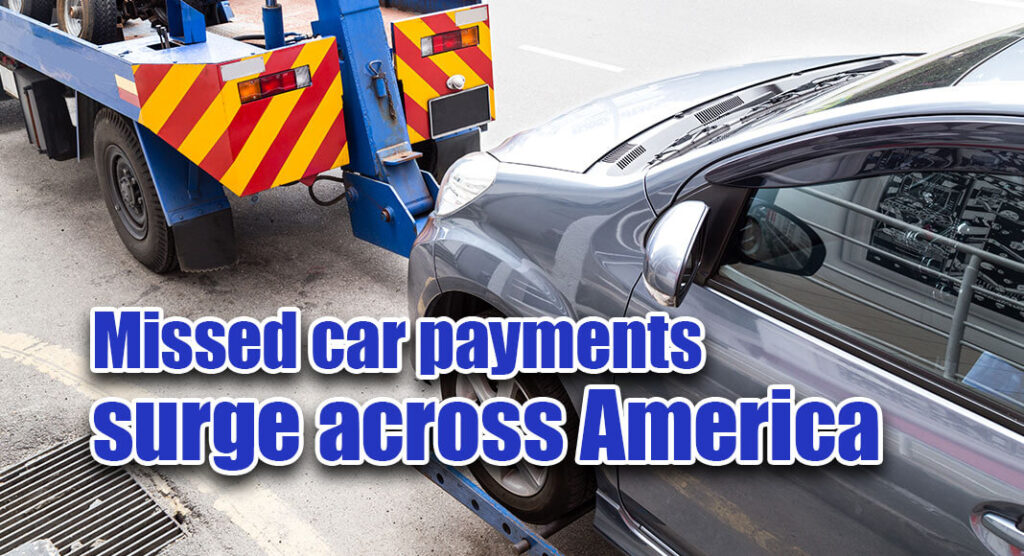
Texas Border Business
- Mississippi has the highest percentage of its auto debt balance in delinquency of more than 90 days at 6.77%, 61% above the national average.
- Alabama is second, with 6.05% of auto loan balances in more than 90 days of delinquency.
- Georgia is third, with 5.71%.
A new study has revealed that Mississippi has the highest percentage of auto loan balances with more than 90 days of delinquency.
Wrongful Repossession Attorneys Thompson Consumer Law Group analyzed 2022 and 2023 auto loan data from the Federal Reserve Bank of New York to see which states had the highest percentage of auto loan balances delinquent for more than 90 days. A loan becomes delinquent once a borrower misses a payment.
The study also found that the percentage of auto loan balances with more than 90 days of delinquency is increasing nationwide. Between Q4 2022 and Q4 2023, the percentage of auto loan balances over 90 days delinquent in America increased from 3.81% to 4.2%, and every state saw an increase in the percentage of delinquent auto loan balances.
1. Mississippi
Mississippi tops the list of states with the highest percentage of auto loan balances in greater than 90 days of delinquency in Q4 2023 at 6.77%, 61% above the national average of 4.2%. The increase of 0.67 percentage points from 6.1% in Q4 2022, 2022’s highest figure, is 72% higher than the average percentage point increase for America of 0.39 and the fourth largest percentage point increase in America.
2. Alabama
Alabama is second, with 6.05% of auto loan balances in greater than 90 days of delinquency in Q4 2023, 44% above the national average. Alabama also had the second-highest figure in Q4 2022 of 5.58%.
3. Georgia
Georgia has the third highest percentage of auto loan balances that have been unpaid for more than 90 days in Q4 2023, moving up from fourth in Q4 2022. This percentage stands at 5.71% in Q4 2023, 36% above the national average, a 0.76 percentage point increase from Q4 2022’s figure of 4.96%. This is the second largest percentage point increase in America, and 93% above the national average of a 0.39 increase.
4. Louisiana
In fourth is Louisiana, moving down one place from 2022. In Q4 2022, the percentage of auto loan balances with more than 90 days non-payment was 5.44%, which increased to 5.69% in Q4 2023, a figure 35% above the national average of 4.2%.
5. Indiana
Indiana rose two places from seventh in 2022 to fifth in 2023. Auto loan balances in greater than 90 days of delinquency increased from 4.72% in 2022 to 5.29% in 2023, 26% above the national average.
6. Hawaii
Hawaii saw a dramatic increase in delinquent auto loan balances between 2022 and 2023, rising 25 places from 31st in 2022 to sixth in 2023. In 2022, delinquent auto loan balances were at 2.88%, which increased 2.36 percentage points to 5.24% in 2023, 25% above the national average. This increase was over six times the 0.39 percentage point increase the US overall experienced.
7. Michigan
Michigan dropped one place from sixth in 2022 to seventh in 2023. The percentage of unpaid auto loan balances increased from 4.83% in Q4 2022 to 5.24% in Q4 2023, 25% above the national average of 4.2%.
8. Delaware
Delaware rose two places from tenth in 2022 to eighth in 2023. The percentage of auto loan balances greater than 90 days delinquent stood at 5.2% in Q4 2023, 24% above the national average. This was an increase of 0.72 percentage points from 4.48% in Q4 2022, the third largest percentage point increase in America.
9. South Carolina
South Carolina dropped a place from eighth in 2022 to ninth in 2023. The percentage of delinquent auto loan balances increased from 4.65%in 2022 to 5.2% in 2023.
10. North Carolina
Rounding out 2023’s top ten is North Carolina, which also dropped a place from ninth in 2022. The percentage of auto loan balances with more than 90 days non-payment increased 0.6 percentage points from 4.54% in 2022 to 5.14% in 2023, the fifth largest increase in the nation.
Russell S. Thompson, Managing Partner at Thompson Consumer Law Group, said:
“When an auto loan has more than 90 days of non-payment, that is usually when lenders start to attempt to repossess a vehicle, so an increase of auto loan balances with more than 90 days delinquency will likely mean more repossessions.
“Mississippi had the highest percentage of auto loan balances with more than 90 days of delinquency in both 2022 and 2023, whereas Utah had the lowest percentage in both 2022 and 2023.
“Auto loan delinquency is still rising across America, with every state showing some increase in delinquency in 2023, likely meaning repossessions will increase in kind.
“Higher numbers of repossessions bring the risk of higher numbers of wrongful repossessions with it. There are two main types of wrongful repossession: Breach of Peace repossessions and No Right repossessions.
“A Breach of Peace repossession happens when repossession agents employ aggressive or unlawful tactics during the repossession. Some examples of what may count for this are using physical force, intimidation, threats, or trespassing on private property. During a repossession, consumers have the right to be free from harm and coercion, and these acts violate these rights.
“A No Right repossession happens when lenders repossess a vehicle they don’t have the right to repossess. Some examples of this may be taking the wrong vehicle, taking a vehicle despite the borrower not being delinquent, or the lender lacking the proper documentation to allow a repossession.
“Repossessions can become wrongful due to many other reasons at many points during the repossession process, and the law varies from place to place. It may be prudent for a consumer to enlist legal help to give them the best chance of winning their case, as a consumer may seek financial compensation if a repossession is wrongful.”
Table showing the percentage of auto loan balances greater than 90 days delinquent in Q4 2022 and Q4 2023 for the states with the highest 2023 figures and the US overall. The table is ranked by the percentage of auto loan balances that were greater than 90 days delinquent in Q4 2023 from the highest to the lowest. The table also shows a comparison of 2023’s figures to 2022’s, and comparisons between each state and the US overall for the percentage point change in delinquent auto loan balances from 2022 to 2023.
| Rank % of auto loan balances >90 days delinquent in Q4 2023 | State | Percent of auto debt balance >90 days delinquent in Q4 2023 | Difference to Q4 2023 US Overall | Percent of auto debt balance >90 days delinquent in Q4 2022 | Percentage point increase of >90 day delinquent auto loan balances from 2022 to 2023 | Percent difference in state increase to US overall increase from 2022 to 2023 |
| 1. | Mississippi | 6.77 | +61% | 6.1 | 0.67 | +72% |
| 2. | Alabama | 6.05 | +44% | 5.58 | 0.48 | +21% |
| 3. | Georgia | 5.71 | +36% | 4.96 | 0.76 | +93% |
| 4. | Louisiana | 5.69 | +35% | 5.44 | 0.24 | -39% |
| 5. | Indiana | 5.29 | +26% | 4.72 | 0.57 | +45% |
| 6. | Hawaii | 5.24 | +25% | 2.88 | 2.36 | +502% |
| 7. | Michigan | 5.24 | +25% | 4.83 | 0.41 | +5% |
| 8. | Delaware | 5.2 | +24% | 4.48 | 0.72 | +83% |
| 9. | South Carolina | 5.2 | +24% | 4.65 | 0.55 | +39% |
| 10. | North Carolina | 5.14 | +22% | 4.54 | 0.60 | +53% |
| US Overall | 4.2 | 3.81 | 0.39 |
Table showing the comparison of rankings for the percentage of auto loan balances greater than 90 days delinquent between 2022 and 2023 for the 10 states with the highest 2023 figures and the US overall. The table is ordered by the percentage of auto loan balances that were greater than 90 days delinquent in Q4 2023 from the highest to the lowest.
| Rank % of auto loan balances >90 days delinquent in Q4 2023 | State | Percent of auto debt balance >90 days delinquent in Q4 2023 | Percent of auto debt balance >90 days delinquent in Q4 2022 | Rank % of auto loan balances >90 days delinquent in Q4 2022 | Change in rank for % of auto loan balances >90 days delinquent from Q4 2022 to Q4 2023 | Rank highest change in percent of >90 day delinquent auto loan balances from 2022 to 2023 |
| 1. | Mississippi | 6.77 | 6.1 | 1 | 0 | 4 |
| 2. | Alabama | 6.05 | 5.58 | 2 | 0 | 12 |
| 3. | Georgia | 5.71 | 4.96 | 4 | +1 | 2 |
| 4. | Louisiana | 5.69 | 5.44 | 3 | -1 | 43 |
| 5. | Indiana | 5.29 | 4.72 | 7 | +2 | 6 |
| 6. | Hawaii | 5.24 | 2.88 | 31 | +25 | 1 |
| 7. | Michigan | 5.24 | 4.83 | 6 | -1 | 21 |
| 8. | Delaware | 5.2 | 4.48 | 10 | +2 | 3 |
| 9. | South Carolina | 5.2 | 4.65 | 8 | -1 | 7 |
| 10. | North Carolina | 5.14 | 4.54 | 9 | -1 | 5 |
| US Overall | 4.2 | 3.81 |
Insights provided by Thompson Consumer Law Group, PC.
Source:
State Level Household Debt Statistics 2003-2023, Federal Reserve Bank of New York, February, 2024.
Federal Reserve Bank of New York Databank Link
Q4 State-Level Statistics 2003-2023 (Annual) Direct Link to Data
Source for data in reports: New York Fed Consumer Credit Panel/Equifax














